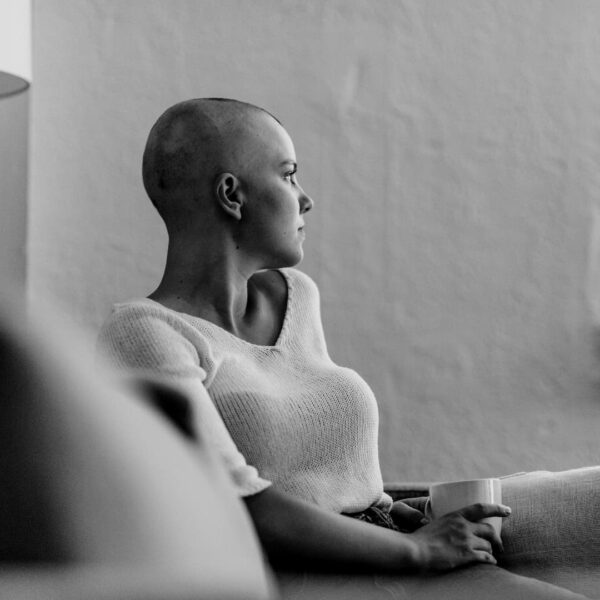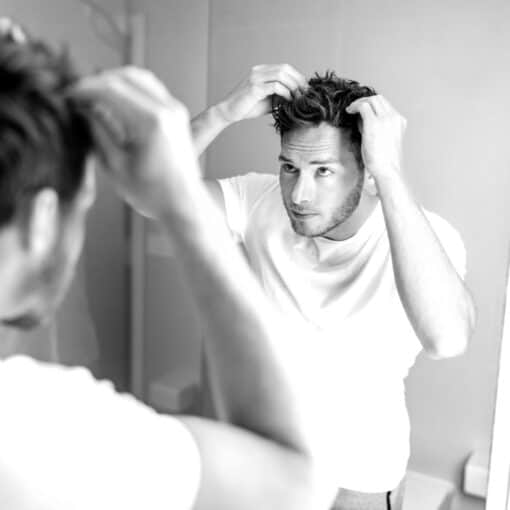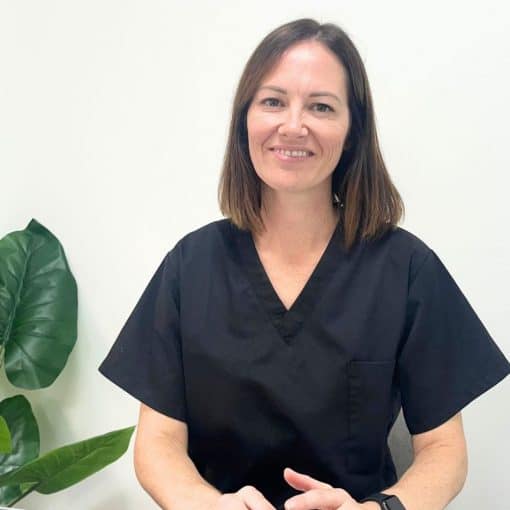
Female Hair Loss – What’s it all about and can anything help?

Blog by Guest Contributor, Aderans Hair Centre Trichologist & SMP Specialist Emma
It’s not really the first thing we want to think of, talk or read about, is it? But it’s happening to an increasing number of women, for many different reasons, so reading about it and working together to support each other, we must!
Thinning hair; female pattern baldness; alopecia; haven’t women had their fair share to deal with through the years. Puberty and all that comes with it, monthly meltdowns or hot-water-bottle-sofa-hugging-chocolate-gorging-fests, pregnancies and childbirth, all with their own complexities and physical demands, then low and behold menopause. Even without the latter in the mix, female hormones, I’d say, have given us our fair share of out-of-control experiences to have to deal with any extras… thank you! So, when hair loss comes along, from thinning and/or change of texture, to receding hair lines and advanced alopecia, the effect is rarely positive and not being in control of something we take pride in and spend countless hours personalising is often upsetting and difficult to deal with.
Many women I speak to in clinic describe the same feelings as to how their hair loss makes them feel; sad, worried, anxious, consumed, upset, powerless and out of control. Many also say they know they’re not physically sick and that thinking about their hair loss so much makes them feel guilty, but we shouldn’t feel like that. Every emotion we have is ours to feel and we shouldn’t feel guilt for being concerned about our hair, just because it’s considered an aspect of our appearance. We already bear the guilt of consuming the whole large bag of crisps, the glass of wine that turned into the bottle, the whole bar of chocolate that was meant to be a square… the mummy guilt at going to work, seeing friends, or spending time on ourselves. Let’s face it, the list could go on and on.
Today we’re talking about hair loss, let’s take a moment to expel the guilt, it’s ok to feel concerned about how our hair looks, isn’t it? Yes, it is. We spend how much on hair products throughout life? How much on the hairdresser? How much on styling products, dryers and wands? We have all invested in our hair, in our ‘crowning glory’ to make it part of our identity and when it starts to change without our control, why wouldn’t we start to worry? Ladies, it is 100% okay to feel worried and concerned about your hair.
What if I lose it all? Why is it falling out? What can I do? Who do I turn to? If I say nothing, will it stop? What can I buy to make it stop? The questions invade the mind and consume thoughts. Let’s take a breath and look at some options.
In reality, without professional advice and support it can be very confusing and daunting to know what to try or do. The first option therefore is to seek advice from a specialist. I cannot recommend this enough, I even mentioned it in a recent You magazine article where the journalist struggled on her own until she was put in touch with me to talk through her hair loss and potential treatments.
Hair loss specialists come in different forms but the term for a hair and scalp specialist is a Trichologist. Trichologists are qualified in the science and treatment of hair loss and scalp conditions. Trichologists look at your condition and concerns from a holistic point of view, taking your lifestyle, diet, medication and general health into account.
As trichology is not currently a service offered on the NHS, another option is to speak to your GP or local health authority. Some GPs have specialist training in hair loss and can help diagnose and treat conditions, whereas others may refer you to the dermatology department for more specialised consultation and treatment options. Some trichologists will also refer to a dermatologist, either way you are getting the best advice possible that is relevant to you. Speaking to a hair loss professional also gives you the opportunity to ask any questions you have and to have someone listen to your concerns before offering advice and treatment options. It is worth the investment of time to seek specialist advice.
So, what are the potential treatments? Thanks to the wonder of science and innovation there are more hair loss solution options available now than ever before, which unfortunately doesn’t mean all bases are covered but does mean that as science continues to develop more people can be helped and supported.
Treatment Opportunities
- Topical treatments
Ranging from shampoos and conditioners to treatment products to calm irritation and inflammation, soothe scalp conditions or stimulate healthy hair growth. In-clinic topical treatments can be supported with take home products to enhance results.
- Low level laser light therapy
LLLLT is available as both in-clinic and at home treatments. The specialised devices emit light therapy to encourage each hair follicle to function as its best and grow healthy strong hair.
- Micropigmentation
Micropigmentation is the process of implanting pigment into the skin to re-create something that is missing or to camouflage the loss of something. Hair loss micropigmentation includes treatments for the scalp; to increase the illusion of more density in thinning areas or give total coverage to areas without hair; eyebrow treatments, re-creating hair stroke eyebrows and expression to the face and eyeliner treatments to give definition to the eyes where lashes have been lost.
- Mesotherapy
Hair mesotherapy is a treatment whereby micro-injections deliver ‘cocktails’ of products, such as vitamins, amino acids and growth factors, into the scalp to encourage healthy hair growth.
- PRP
Another injectable treatment for hair loss with the aim of encouraging healthy hair growth. With PRP treatments your own blood is taken, and the platelet rich plasma is then separated, processed and injected back into the target area.
- Medication
There is unfortunately no wonder drug out there at present for every type of hair loss. Some conditions can respond well to medication such as Minoxidil for pattern hair loss but its worth noting that once a medication is taken it usually needs to be maintained or the effect is lost, and the hair loss returns. Scientific advances, research programmes and investment will hopefully result in more readily available medications to help prevent and treat hair loss.
- Diet / Nutrition
The impact our diet and nutritional intake can have on hair growth should not be underestimated. As with the rest of our body our hair needs the right type of food to grow, be healthy and strong. Protein, iron and a range of vitamins are some of the essential dietary elements for hair.
- Hair Transplant Surgery
Not always the first route considered for women, but an option to consider for some hair loss conditions, nonetheless. Hair is taken from a donor site, usually on the back of the head or ‘occipital zone’ where the hair is more resilient to loss and re-implanted into the thinning area or area of concern. As a surgical procedure it does have some down time but advanced protocols are giving female patients increasing options.
Which is the right treatment plan for you? The best way to find out is to once again seek the advice of a hair loss professional. Hopefully the list of just some of the main treatments above will show you that there is a variety of options out there and often a combination of treatments is the most effective route to restoring hair confidence.
So, what now? Now it’s time for you to take action, don’t let your hair loss concerns weigh you down, contact a specialist, look for local or online support groups and seek advice. We’re all in this together, your own concerns are unique to you but there’s always someone to help.
Emma x
To read the full article Emma was featured in please click here




